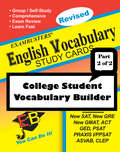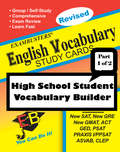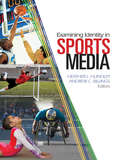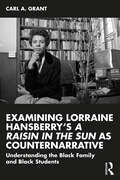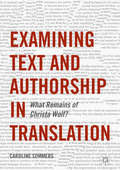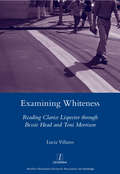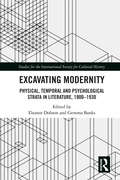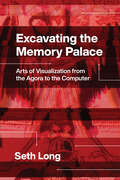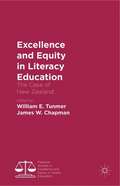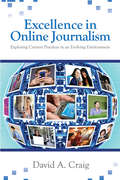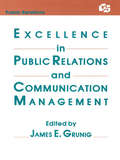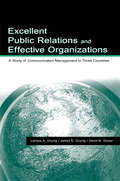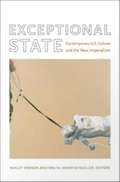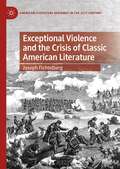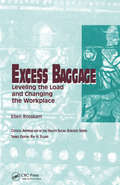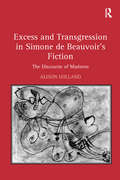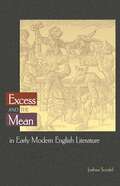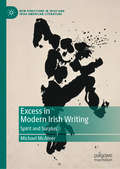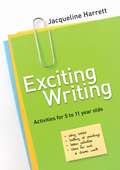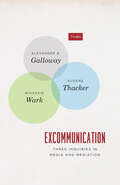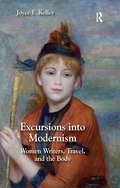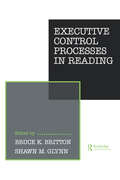- Table View
- List View
Exambusters English Vocabulary Study Cards: College (Exambusters Vocabulary #2)
by Ace AcademicsEXAMBUSTERS College Student English Vocabulary Builder Parts 1 and 2 eBook flash cards: Over 350 words every well-educated person should know. While you may not hear them every day, they can show up on standardized exams, and understanding them will boost your score. Includes sample sentence, part of speech, pronunciation, succinct, easy-to-remember definition, and common synonyms and antonyms. Compiled by certified teachers and college professors with a focus on exam preparation. Highlights the essentials to test well. Prepare for quizzes, tests, New SAT, PRAXIS I, GED, GRE, PSAT, GMAT, ACT . . . . A COURSE in an eBook! ======================================== Ace Academics "Exambusters Study Cards" for test prep are tailored to fourteen different standardized tests (for example: SAT, GED, GRE, MCAT, PRAXIS) The flash card format is available in printed cards, CD-Rom software and eBooks.
Exambusters English Vocabulary Study Cards: High School (Exambusters Vocabulary #1)
by Ace AcademicsEXAMBUSTERS High School Student English Vocabulary Builder eBook flash cards: Over 350 frequently tested words every college-bound student should know. Perfect for anyone who wants to enrich their vocabulary! Improve your reading comprehension and conversation. Includes sample sentence, part of speech, pronunciation, succinct, easy-to-remember definition, and common synonyms and antonyms. Compiled by certified teachers and college professors with a focus on exam preparation. Prepare for quizzes, tests, New SAT, PRAXIS I, GED, GRE, PSAT, GMAT, ACT . . . . A COURSE in an eBook! <P><P>Ace Academics "Exambusters Study Cards" for test prep are tailored to fourteen different standardized tests (for example: SAT, GED, GRE, MCAT, PRAXIS) The flash card format is available in printed cards, CD-Rom software and eBooks. <P><P><i>Advisory: Bookshare has learned that this book offers only partial accessibility. We have kept it in the collection because it is useful for some of our members. Benetech is actively working on projects to improve accessibility issues such as these in the future.</i>
Examining Identity in Sports Media
by Andrew C. Billings Heather HundleyIncluding the work of top sports communication researchers, Examining Identity in Sports Media explores identity issues, including gender, ethnicity, nationality, sexual orientation, and (dis)ability, as well as the intersections within these various identity issues. This co-edited, twelve-chapter book investigates how various identity groups are framed, treated, affected, and shaped by a ubiquitous sports media, including television, magazines, film, the Internet, and newspapers. While other books may devote a chapter or section to issues of identity in sports media, this book offers a complete examination of identity from cover to cover, allowing identity variables to be both isolated and intermingled to capture how identity is negotiated within sports media platforms. Far more than a series of case studies, this book surveys the current state of the field while providing insight on future directions for identity scholarship in sports communication. Examining Identity in Sports Media is ideal for undergraduate or graduate-level courses in Sports Communication, Sports Media, Media Criticism, Sports Sociology, Gender Communication, and Identity Politics.
Examining Lorraine Hansberry’s A Raisin in the Sun as Counternarrative: Understanding the Black Family and Black Students
by Carl A. GrantExamining Lorraine Hansberry’s A Raisin in the Sun as Counternarrative: Understanding the Black Family and Black Students shows how and why Lorraine Hansberry’s play, A Raisin in the Sun, should be used as a teaching tool to help educators develop a more accurate and authentic understanding of the Black Family. The purpose of this book is to help educators develop a greater awareness of Black children and youth’s, humanity, academic potential and learning capacity, and for teachers to develop the consciousness to disavow white supremacy, American exceptionalism, myths, racial innocence, and personal absolution within the education system. This counternarrative responds to the flawed and racist perceptions, stereotypes, and tropes that are perpetuated in schools and society about the African American family and Black students in US schools. It is deliberative and reverberating in addressing anti-Black racism. It argues that, if Education is to be reimagined through a social justice structure, teachers must be educated with works that include Black artists and educators, and teachers must be committed to decolonizing their own minds. Examining Lorraine Hansberry’s A Raisin in the Sun as Counternarrative: Understanding the Black Family and Black Students is important reading for undergraduate and postgraduate courses in Educational Foundations, Curriculum and Instruction, Education Policy, Multicultural Education, Social Justice Education, and Black Studies. It will also be beneficial reading for in-service educators.
Examining Text and Authorship in Translation
by Caroline SummersThis book, the first in-depth study of authorship in translation, explores how authorial identity is 'translated' in the literary text. In a detailed exploration of the writing of East German author Christa Wolf in English translation, it examines how the work of translators, publishers, readers and reviewers reframes the writer's identity for a new reading public. This detailed study of Wolf, an author with a complex and contested public profile, intervenes in wide-ranging contemporary debates on globalised literary culture by examining how the fragmented identity of the 'international' author is contested by different stakeholders in the construction of a world literature. The book is interdisciplinary in its approach, representing new work in Translation Studies and German Studies that is also of interest and relevance to scholars of literature in other languages.
Examining Whiteness: Reading Clarice Lispector Through Bessie Head and Toni Morrison
by Lucia Villares"Critics consider Clarice Lispector the leading female writer in the Brazilian literary canon. Her connections with the nation, however, seem to magically disappear as her work is analysed. This paradox is the starting point for this analysis of the works of an author who - despite being born in the Ukraine - grew up to be an irreplacable presence in Brazilian literature. Non-Brazilian authors, such as the South African Bessie Head and the North American Toni Morrison, provide triggering concepts to help tackle a blind-spot in Brazilian culture: the issue of racial difference. From this new perspective, overlooked black characters in Lispector's work become crucial and relevant, and whiteness emerges as an unexamined set of norms."
Excavating Modernity: Physical, Temporal and Psychological Strata in Literature, 1900-1930 (Studies for the International Society for Cultural History)
by Eleanor Dobson Gemma BanksThis book scrutinizes physical, temporal and psychological strata across early twentieth-century literature, focusing on geological and archaeological tropes and conceptions of the stratified psyche. The essays explore psychological perceptions, from practices of envisioning that mimic looking at a painting, photograph or projected light, to the comprehension of the palimpsestic complexities of language, memory and time. This collection is the first to see early twentieth-century physical, temporal and psychological strata interact across a range of canonical and popular authors, working in a variety of genres, from theatre to ghost stories, children’s literature to modernist magna opera.
Excavating the Memory Palace: Arts of Visualization from the Agora to the Computer
by Seth LongWith the prevalence of smartphones, massive data storage, and search engines, we might think of today as the height of the information age. In reality, every era has faced its own challenges of storing, organizing, and accessing information. While they lacked digital devices, our ancestors, when faced with information overload, utilized some of the same techniques that underlie our modern interfaces: they visualized and spatialized data, tying it to the emotional and sensory spaces of memory, thereby turning their minds into a visual interface for accessing information. In Excavating the Memory Palace, Seth David Long mines the history of Europe’s arts of memory to find the origins of today’s data visualizations, unearthing how ancient constructions of cognitive pathways paved the way for modern technological interfaces. Looking to techniques like the memory palace, he finds the ways that information has been tied to sensory and visual experience, turning raw data into lucid knowledge. From the icons of smart phone screens to massive network graphs, Long shows us the ancestry of the cyberscape and unveils the history of memory as a creative act.
Excellence and Equity in Literacy Education
by William E. Tunmer James W. ChapmanLiteracy is arguably the most important goal of schooling as, to a large extent, it determines young children's educational and life chances and is fundamental in achieving social justice. New Zealand's literacy education programme has long been regarded as one of the world's most successful approaches to teaching literacy skills to young children. Excellence and Equity in Literacy Education questions this widely held assumption. In the late 1990s the New Zealand government developed a national literacy strategy aimed at reducing persistently large inequities in literacy achievement outcomes. The chapters in this edited volume present evidence indicating that the national literacy strategy has failed, examine the major factors responsible for the continuation of New Zealand's comparatively wide spread of scores in literacy achievement, and describe the most effective strategies for reducing the literacy achievement gap and achieving excellence and equity in New Zealand literacy education.
Excellence in Online Journalism: Exploring Current Practices in an Evolving Environment
by David A. CraigLike the technologies that support it, the craft of online journalism is evolving quickly. This timely book helps students develop standards of excellence, through interviews with more than 30 writers, editors and producers, and dozens of examples of strong work. The author provides a framework of concepts to show how the field is evolving and challenged by competition, staffing limitations, and other pressures. Discussion is organized around four key elements: speed and accuracy with depth in breaking news; comprehensiveness in multimedia content; open-endedness in story development, including public contributions; and conversation with users. Chapter-length treatments of these topics bring home the realities of online work to students, who also come to appreciate how excellence and ethics online go hand in hand.
Excellence in Public Relations and Communication Management (Routledge Communication Series)
by James E. Grunig Larissa A. Grunig Jon White David M. Dozier William P. Ehling Fred C. RepperThis book is the initial volume coming out of the "excellence project"--a comprehensive research effort commissioned by the IABC (International Association of Business Communicators) Research Foundation. The purpose of this project was to answer two fundamental questions about public relations: What are the characteristics of an excellent communication department? How does excellent public relations make an organization more effective, and how much is that contribution worth economically? The research team began its work with a thorough review of the literature in public relations and related disciplines relevant to these questions. What started as a literature review, however, has ended in a general theory of public relations, one that integrates most of the wide range of ideas about, and practices of, communication management in organizations.
Excellent Public Relations and Effective Organizations: A Study of Communication Management in Three Countries (Routledge Communication Series)
by James E. Grunig David M. DozierThis book is the final product of the "excellence project"--a comprehensive research effort commissioned by the International Association of Business Communicators (IABC) Research Foundation. Going well beyond any of the previously published reports on the Excellence study, this book contains many new statistical analyses of the survey data and more details from the case studies. Discussing theory and data related to several ongoing discussions in the communication profession, this book answers the following questions: *How can we show the value of public relations? *What is the value of relationships? *How do relationships affect reputation? *What does it mean to practice communication strategically? *How can we measure and evaluate the effects of public relations programs? *Should communication programs be integrated? *How does the new female majority in the profession affect communication Excellence? This book, as well as the research it reports, is the product of symmetrical communication and collaboration. As such, it is intended for scholars, applied researchers, students, and informed professionals who understand the value of research in developing a profession, such as public relations. Knowledge of quantitative and qualitative research methods will make it easier to understand the book; however, the results are interpreted in a way that makes the analyses understandable even to those with little or no knowledge of statistics and research methods.
Exceptional State: Contemporary U.S. Culture and the New Imperialism
by Ashley Dawson Malini Johar SchuellerExceptional State analyzes the nexus of culture and contemporary manifestations of U. S. imperialism. The contributors, established and emerging cultural studies scholars, define culture broadly to include a range of media, literature, and political discourse. They do not posit September 11, 2001 as the beginning of U. S. belligerence and authoritarianism at home and abroad, but they do provide context for understanding U. S. responses to and uses of that event. Taken together, the essays stress both the continuities and discontinuities embodied in a present-day U. S. imperialism constituted through expressions of millennialism, exceptionalism, technological might, and visions of world dominance. The contributors address a range of topics, paying particular attention to the dynamics of gender and race. Their essays include a surprising reading of the ostensibly liberal movies Wag the Dog and Three Kings, an exploration of the rhetoric surrounding the plan to remake the military into a high-tech force less dependent on human bodies, a look at the significance of the popular Left Behind series of novels, and an interpretation of the Abu Ghraib prison photos. They scrutinize the national narrative created to justify the U. S. invasions of Afghanistan and Iraq, the ways that women in those countries have responded to the invasions, the contradictions underlying calls for U. S. humanitarian interventions, and the role of Africa in the U. S. imperial imagination. The volume concludes on a hopeful note, with a look at an emerging anti-imperialist public sphere. Contributors. Omar Dahbour, Ashley Dawson, Cynthia Enloe, Melani McAlister, Christian Parenti, Donald E. Pease, John Carlos Rowe, Malini Johar Schueller, Harilaos Stecopoulos
Exceptional Violence and the Crisis of Classic American Literature (American Literature Readings in the 21st Century)
by Joseph FichtelbergThis book is an interdisciplinary study of antebellum American literature and the problem of political emergency. Arguing that the United States endured sustained conflicts over the nature and operation of sovereignty in the unsettled era from the Founding to the Civil War, the book presents two forms of governance: local and regional control, and national governance. The period’s states of exception arose from these clashing imperatives, creating contests over land, finance, and, above all, slavery, that drove national politics. Extensively employing the political and cultural insights of Walter Benjamin, this book surveys antebellum American writers to understand how they situated themselves and their work in relation to these episodes, specifically focusing on the experience of violence. Exploring the work of Edgar Allan Poe, ex-slave narrators like Moses Roper and Henry Bibb, Herman Melville and Emily Dickinson, the book applies some central aspects of Walter Benjamin’s literary and cultural criticism to the deep investment in pain in antebellum politics and culture.
Excess Baggage: Leveling the Load and Changing the Workplace (Critical Approaches in the Health Social Sciences Series)
by Ellen Rosskam Ray H EllingBased on groundbreaking research on the working conditions of airport check-in workers in two countries, a previously unstudied category of predominantly women workers, Ellen Rosskam describes a form of work characterized as modern-day Taylorism. An occupation greatly affected by new forms of work organization and management practices-caught in the throes of rapid change due to international competition, alliances, mergers, and the application of cost-efficiency strategies-check-in work has been undermined in recent years by the adverse effects of liberalization and technological change.By peeling away the veneer of glamour associated with airport check-in work, Rosskam reveals how changes in work organization in this sector have de-skilled, disempowered, and ultimately demoralized workers. In "Excess Baggage", weaving through the psychological distress, physical pain from musculoskeletal disorders, strain, and violence that check-in workers experience and describe in their own words, a picture emerges of a job perceived to be "safe," "clean," "glamour girl" work, but which is comparable to industrial workplaces that require heavy manual lifting, obligingly performed in skirts, dresses, and pretty little shoes.
Excess and Transgression in Simone de Beauvoir's Fiction: The Discourse of Madness
by Alison HollandAlison Holland’s innovative book fills a gap in Beauvoir studies by focusing on the writer’s frequently neglected novels and short stories, L’Invitée, Les Mandarins, Les Belles Images, and La Femme rompue. In illuminating the density and rich complexity of Beauvoir’s style, Holland challenges the often accepted view that Beauvoir’s writing is flat, detached, and controlled, revealing, rather, that her prose is frequently disrupted and inflected by forceful emotion. Holland shows that excess and transgression are intrinsic qualities of the texts, and argues that Beauvoir’s textual strategies duplicate madness in her fiction. Holland’s reading of Beauvoir’s fiction demonstrates the extent to which Beauvoir’s fiction undermines an ideologically patriarchal position on language. Her study is important not only for its re-evaluation of Beauvoir as a fiction writer but for its contribution to the wider debate on madness and literature.
Excess and the Mean in Early Modern English Literature (Literature in History)
by Joshua ScodelThis book examines how English writers from the Elizabethan period to the Restoration transformed and contested the ancient ideal of the virtuous mean. As early modern authors learned at grammar school and university, Aristotle and other classical thinkers praised "golden means" balanced between extremes: courage, for example, as opposed to cowardice or recklessness. By uncovering the enormous variety of English responses to this ethical doctrine, Joshua Scodel revises our understanding of the vital interaction between classical thought and early modern literary culture. Scodel argues that English authors used the ancient schema of means and extremes in innovative and contentious ways hitherto ignored by scholars. Through close readings of diverse writers and genres, he shows that conflicting representations of means and extremes figured prominently in the emergence of a self-consciously modern English culture. Donne, for example, reshaped the classical mean to promote individual freedom, while Bacon held extremism necessary for human empowerment. Imagining a modern rival to ancient Rome, georgics from Spenser to Cowley exhorted England to embody the mean or lauded extreme paths to national greatness. Drinking poetry from Jonson to Rochester expressed opposing visions of convivial moderation and drunken excess, while erotic writing from Sidney to Dryden and Behn pitted extreme passion against the traditional mean of conjugal moderation. Challenging his predecessors in various genres, Milton celebrated golden means of restrained pleasure and self-respect. Throughout this groundbreaking study, Scodel suggests how early modern treatments of means and extremes resonate in present-day cultural debates.
Excess in Modern Irish Writing: Spirit and Surplus (New Directions in Irish and Irish American Literature)
by Michael McAteerThis book examines the topic of excess in modern Irish writing in terms of mysticism, materialism, myth and language. The study engages ideas of excess as they appear in works by major thinkers from Hegel, Kierkegaard and Marx through to Nietzsche, Bataille, Derrida and, more recently, Badiou. Poems, plays and fiction by a wide range of Irish authors are considered. These include works by Oscar Wilde, W. B. Yeats, G. B. Shaw, Patrick Pearse, James Joyce, Sean O’Casey, Louis MacNeice, Samuel Beckett, Elizabeth Bowen, Roddy Doyle, Seamus Heaney, Marina Carr and Medbh McGuckian. The readings presented illustrate how Matthew Arnold’s nineteenth-century idea of the excessive character of the Celt is itself exceeded within the modernity of twentieth-century Irish writing.
Exchanges in Exoticism
by Megan MooreCharting important new territory within medieval gender studies, Megan Moore explores the vital role that women played in transmitting knowledge and empire within Mediterranean cross-cultural marriages. Whereas cross-cultural exchange has typically been understood through the lens of male-centered translation work, this study, which is grounded in the relations between the west and Byzantium, examines cross-cultural marriage as a medium of literary and cultural exchange, one in which women's work was equally important as men's. Moore's readings of Old French and Medieval Greek texts reveal the extent to which women challenged the cultures into which they married and shaped their new courtly environments. Through the lens of medieval gender and postcolonial theory, Exchanges in Exoticism demonstrates how the process of cultural exchange - and empire building - extends well beyond our traditional assumptions about gender roles in the medieval Mediterranean.
Exciting Writing: Activities for 5 to 11 year olds
by Jacqueline HarrettWinner of the United Kingdom Literacy Association (UKLA) Author Award 2007! `This book lives up to its title, providing inspirational teaching ideas, using picture photographs and films as starting points for writing. A worthy winner of the UKLA Teacher′s Book Award′ - TES magazine `The book clearly describes many creative ways to engage children in writing. A number of different approaches are suggested, with activities that amongst others include the use of talk, picture books and other visual stimuli. It explains how these can used effectively and easily in the classroom so that teachers, what ever their level of experience, can feel confident to use them. The activities are manageable with ideas to suit children of all abilities across the primary age range′ - Liz Sharp, Literacy Consultant, Milton Keynes LEA Based on her experiences as a class teacher, Jacqueline Harrett′s book is packed with exciting, creative ideas for teaching writing in the classroom. With activities for Key Stages 1 and 2, it shows busy class teachers how children′s literacy is relevant across the curriculum. Each chapter uses a different idea to get children writing, and the following are all used as a starting point for lively literacy lessons: - imagination and visualisation - picture books - photographs - paintings - films and TV - comics Primary school teachers, Literacy Co-ordinators, trainee teachers and anyone looking for engaging and imaginative ideas to help them teach writing in their classroom will find this book fits the bill.
Exclamation Mark
by Amy Krouse Rosenthal Tom LichtenheldFrom the bestselling creators of Duck Rabbit , an exciting tale of self-discovery. He stood out here. He stood out there. He tried everything to be more like them. It's not easy being seen. Especially when you're NOT like everyone else. Especially when what sets you apart is YOU. Sometimes we squish ourselves to fit in. We shrink. Twist. Bend. Until a friend shows the way to endless possibilities. In this bold and highly visual book, an emphatic but misplaced exclamation point learns that being different can be very exciting. Period.
Exclamation Mark
by Amy Krouse Rosenthal Tom LichtenheldFrom the New York Times–bestselling creators of Duck! Rabbit!, an exciting tale of self-discovery! “This picture book deserves a !!!” —Booklist (starred review)He stood out here. He stood out there. He tried everything to be more like them. It’s not easy being seen. Especially when you’re NOT like everyone else. Especially when what sets you apart is YOU.Sometimes we squish ourselves to fit in. We shrink. Twist. Bend. Until—!—a friend shows the way to endless possibilities. In this bold and highly visual book, an emphatic but misplaced exclamation point learns that being different can be very exciting! Period.
Excommunication: Three Inquiries in Media and Mediation (TRIOS)
by Alexander R. Galloway Eugene Thacker McKenzie WarkAlways connect—that is the imperative of today’s media. But what about those moments when media cease to function properly, when messages go beyond the sender and receiver to become excluded from the world of communication itself—those messages that state: “There will be no more messages”? In this book, Alexander R. Galloway, Eugene Thacker, and McKenzie Wark turn our usual understanding of media and mediation on its head by arguing that these moments reveal the ways the impossibility of communication is integral to communication itself—instances they call excommunication. In three linked essays, Excommunication pursues this elusive topic by looking at mediation in the face of banishment, exclusion, and heresy, and by contemplating the possibilities of communication with the great beyond. First, Galloway proposes an original theory of mediation based on classical literature and philosophy, using Hermes, Iris, and the Furies to map out three of the most prevalent modes of mediation today—mediation as exchange, as illumination, and as network. Then, Thacker goes boldly beyond Galloway’s classification scheme by examining the concept of excommunication through the secret link between the modern horror genre and medieval mysticism. Charting a trajectory of examples from H. P. Lovecraft to Meister Eckhart, Thacker explores those instances when one communicates or connects with the inaccessible, dubbing such modes of mediation “haunted” or “weird” to underscore their inaccessibility. Finally, Wark evokes the poetics of the infuriated swarm as a queer politics of heresy that deviates from both media theory and the traditional left. He posits a critical theory that celebrates heresy and that is distinct from those that now venerate Saint Paul. Reexamining commonplace definitions of media, mediation, and communication, Excommunication offers a glimpse into the realm of the nonhuman to find a theory of mediation adequate to our present condition.
Excursions into Modernism: Women Writers, Travel, and the Body
by Joyce KelleyPositioned at a crossroads between feminist geographies and modernist studies, Excursions into Modernism considers transnational modernist fiction in tandem with more rarely explored travel narratives by women of the period who felt increasingly free to journey abroad and redefine themselves through travel. In an era when Western artists, writers, and musicians sought 'primitive' ideas for artistic renewal, Joyce E. Kelley locates a key similarity between fiction and travel writing in the way women authors use foreign experiences to inspire innovations with written expression and self-articulation. She focuses on the pairing of outward journeys with more inward, introspective ones made possible through reconceptualizing and mobilizing elements of women’s traditional corporeal and domestic geographies: the skin, the ill body, the womb, and the piano. In texts ranging from Jean Rhys’s Voyage in the Dark to Virginia Woolf’s The Voyage Out and from Evelyn Scott’s Escapade to Dorothy Richardson’s Pilgrimage, Kelley explores how interactions between geographic movement, identity formation, and imaginative excursions produce modernist experimentation. Drawing on fascinating supplementary and archival materials such as letters, diaries, newspaper articles, photographs, and unpublished drafts, Kelley’s book cuts across national and geographic borders to offer rich and often revisionary interpretations of both canonical and lesser-known works.
Executive Control Processes in Reading (Psychology of Reading and Reading Instruction Series)
by Bruce K. Britton Shawn M. GlynnFirst published in 1987. Routledge is an imprint of Taylor & Francis, an informa company.
